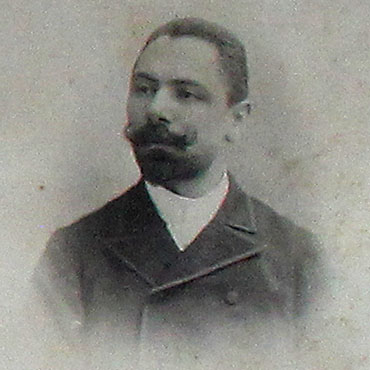Marchesini was born in Verona in 1865 and studied in Padua, where he graduated in 1887 with a dissertation on Brunetto Latini, of which he published a number of extracts. In Florence he developed his studies of philology and palaeography under the guidance of Pio Rajna and Cesare Paoli, working on Albertino Mussato and Filippo Villani, of whom later he published much hitherto unpublished material in the “Archivio storico Italiano”. With the encouragement of Adolfo Bartoli, he got involved with manuscripts of Dante, submitting several articles to the “Bullettino della Società dantesca italiana”, of which Bartoli himself was one of the founders. The fact that he had become a Florentine by adoption did not erase his memory of his birth town, to which Marchesini dedicated a number of various learned studies. In 1889 Isidoro Del Lungo obtained permission from the Minister of Education to take on “someone to help with work relating to textual criticism of the National edition of the works of Galileo” and at his suggestion Marchesini was nominated as literary assistant. To carry out this task he asked to be excused from teaching, which he had undertaken for some time.
Whereas with Isidoro Del Lungo their mutual esteem and affection escalated into a friendship so close that Marchesini often addressed the master, calling him “father”, with Antonio Favaro the co-existence was difficult. Favaro had a different way of organising himself and an infinitely greater level of physical and mental energy. He could not tolerate the slow progress and the long breaks and this caused his young collaborator to be permanently on edge and always in difficulty over juggling the load of work that was excessive for his strength and poor health that would lead to his premature death.
This, however, did not lower Favaro’s regard for the ability and competence of Marchesini. As well as helping Isidoro Del Lungo to prepare the texts, Marchesini was asked to replace Edmondo Solmi, considered not to be up to the task assigned to him to help in the preparation of the massive index of names and noteworthy things. As for Favaro, he never lost that sense of human proximity that, despite everything, the product of years and years of collaboration. “Although it was expected, the news of the death of our assistant has distressed me very much”, he wrote to Del Lungo as soon as heard the news of the death of Marchesini, “and all the more so because, once the reason for little frictions ended, I would have had in him a very faithful friend, because we knew our respective weaknesses and had ended up accepting them”. Umberto Marchesini died in 1910 at Ospedaletti in Liguria, where he had gone in a futile attempt to recuperate. He was buried in Verona and the writing on his tombstone was composed by Isidoro Del Lungo.


